In 2007, Donald Katz decided to move the offices of Audible—the audiobook platform he founded more than two decades ago, now the largest audiobook producer and retailer, and an Amazon subsidiary—from suburban New Jersey into the heart of Newark. It was an unusual move for a tech startup (Newark wasn’t known for its tech scene), but for Katz, it was a powerful way to articulate the values and aspirations of his young company including his approach to being CEO. Rather than setting the company back, Katz credits the move with his success in building a strong culture and a personal legacy.
When he first moved the headquarters to Newark, he was told that the company would lose 25% of its workforce. Contrary to those predictions, Katz says they didn’t lose anyone. And, today, Audible is the fastest growing private sector employer in Newark.
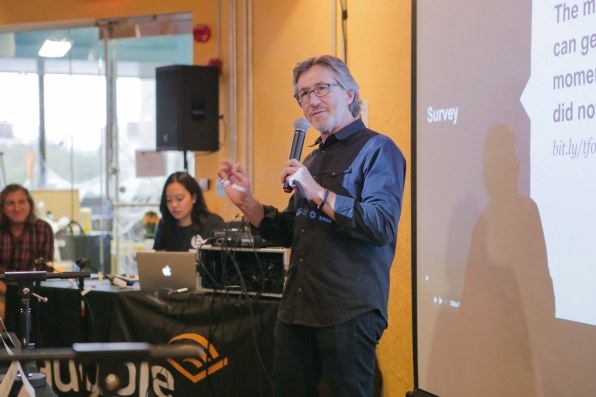
The Fanny Pack Moment
Katz began his career in the early 70s as an author and journalist. At the time, he regularly went on runs in Riverside Park, listening to books on tape from a tape player in his fanny pack. While working on a column for Esquire on the potential of the internet, he recalls a phone conversation with his college roommate who was a supercomputer designer. They were talking about analog and digital processing when, he says, he had his “eureka moment.” Katz realized that instead of having to rent tapes he could eventually access every book ever printed from a device that he could keep in his fanny pack. “You’re saying in theory, there could be a digital inventory that would never be out of stock, and there wouldn’t be any need to go out of print?” he recalls saying in that conversation.
He hung up and thought about it some more, and then quickly called his roommate back, “We need to figure out a way to liberate the signal. We need to create a device that you can take in your car or the park or to your job. That conversation sparked the beginning of the first digital audiobook platform; the iPod was still four years away.
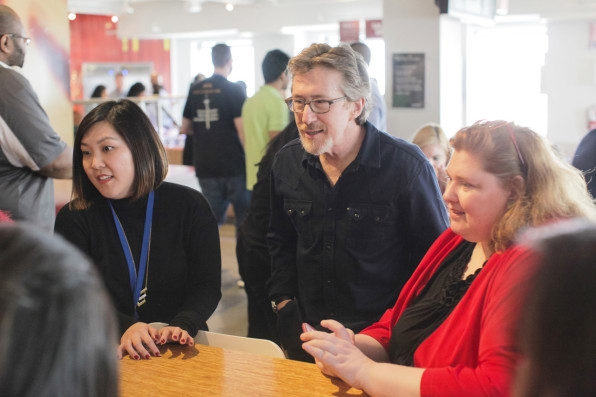
Journalist turned CEO
Like BECU’s Benson Porter and Steelcase CEO Jim Keane, whom I’ve previously profiled in this series, Katz strikes me as part CEO and part anthropologist, deeply interested in the intersection of people and the environments where they live and work.
As a journalist, Katz wrote about iconic American companies like Sears and Nike, and he won critical acclaim for his book chronicling the experience of the middle class in postwar America. He credits his career in journalism with teaching him how to be an inventor, “There’s no better training for starting an invention company than being an inquisitive writer. You have to go out and find the facts, as a journalist. It’s a fantastic backdrop for being morally and courageously honest about what you don’t know.”
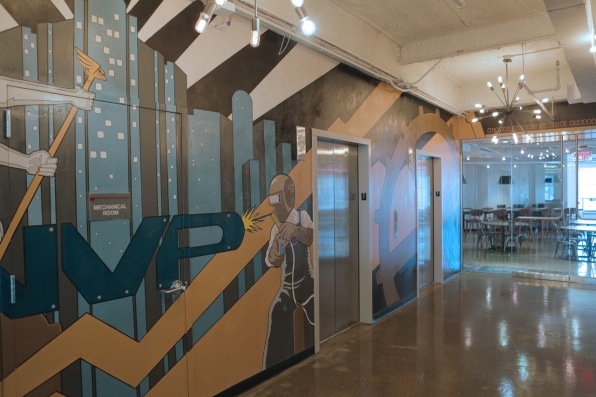
Moving to Newark
Unlike companies that are lured to incorporate in cities with tax benefits and other government subsidies, Katz says he made the move to Newark without any perks, “We just did it because we wanted to. At that point, we knew we were becoming really successful.” But he says they didn’t want to be another company that was successful and then parachuted into a community in distress for charity dinners. Instead, Katz saw the potential to impact a community in need at its core, and he has been experimenting with a wide range of programs and policies to maximize the impact of being in Newark.
“The first thing I did was kind of make a rule that we would only hire Newark’s students for paid internships, of which we had many.” This was at a time when Audible was quickly becoming the largest employer of actors in the New York City area, to do voice work reading books. In their office in Newark “there were actors everywhere, and all these amazing kids, largely from North Star Academy, [a public charter school based in Newark and one of the first in New Jersey],” says Katz.
Over the last decade, this program has morphed into an internship, mentorship, and college scholarship program. The program now has 26 interns and 29 scholars, “We embed these interns in Audible departments; teach them professional and communications soft-skills through a non-cognitive skills curriculum; and support them with scholarships through college. Our culture has soared by bringing in these amazing kids.”
In addition, “nearly half of Audible’s entry-level customer service positions are filled with Newark’s residents. And our recruiting team is doubling down on ways to focus on community recruiting with the goal of identifying Newark talent for opportunities across all levels.”
In an effort to bring cultural diversity and economic vitality to Newark, and shorter commutes, Audible has been motivating its employees to live in the city and support local businesses. The company has supported the redevelopment of the Hahne & Company building in downtown Newark, by providing 20 Audible employees with one year of free rent to live there through a housing lottery that was announced at the start of the year. Audible has now expanded the program to offer a $250 monthly subsidy to cover living expenses to employees who want to move to Newark. Audible also offers pre-paid debit cards that employees can use to dine at Newark restaurants of their choice.
Through a series of such moves, Katz has integrated his company with the city where they work. It’s a strikingly different approach from the one that tech companies like Apple, Facebook or Google have taken, in building giant corporate campuses with shuttle buses that bring employees to work from faraway locations.
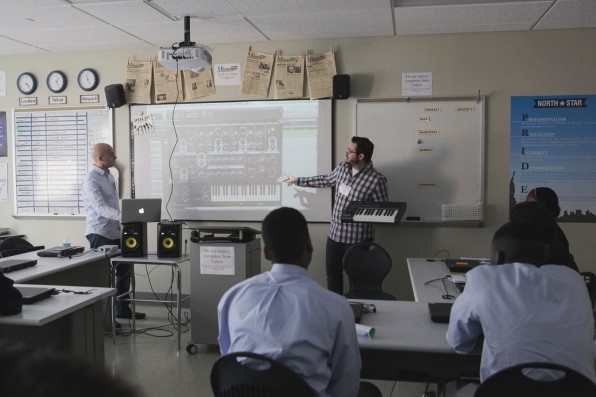
Newark Venture Partners Fund
Perhaps Katz’s biggest insight to transform Newark came from the realization that if Newark had other employers of the scale of Audible, it would transform the city financially and culturally. He has taken this on as his new project, creating Newark Venture Partners Fund, which is an independent early stage venture fund, supported by Audible, on the 7th floor of the Audible building. The facility currently hosts 26 companies and 70 founders.
When 1,200 entrepreneurs applied to be part of the space, Katz wasn’t surprised by the demand. “There are 40,000 college students here [in Newark], and the vast majority, are first-in-family degree getters, that come from immigrant-backgrounds. If you look at all the stats of who creates high-tech companies—something like 70% of patents in the last 10 years—that’s the profile.”
The company is investing money and talent in these new companies. Audible employees are constantly on the 7th floor teaching master classes and advising the entrepreneurs, he says. It’s a resource that few startups can access, as well as an opportunity for growth and impact that few employees of large companies can take advantage of.
The fund is measuring traditional metrics associated with startups (like top-line revenue, burn rate etc.) as well as their impact on Newark. They are building their capacity to “report out on measurable job growth, measurable taxable revenue, incremental foot traffic into Newark, and street level amenity creation.”
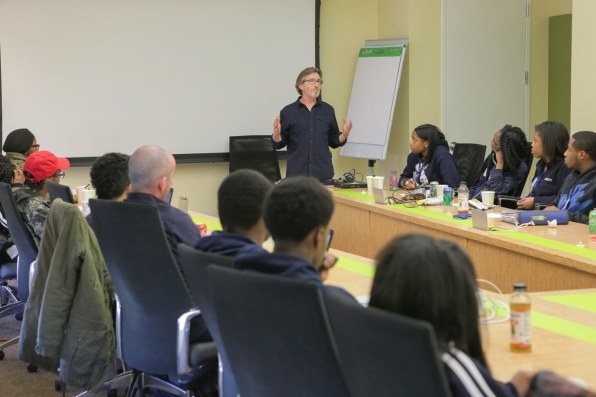
Activating Caring
Audible’s community building efforts are bringing an entrepreneurial spirit to Newark that goes well beyond conventional CSR (or diversity and inclusion) initiatives that companies undertake, evolving these activities into something more integrated and authentic.
Katz has gone from studying companies and cultures to building a culture of “activating caring” within Audible along with the city where they are based. As he explains, their work stems from “a core belief that companies can have hearts and souls and missions that transcend financial success.” It is this value that he is now looking to document and share with other CEOs around the country and world. “If other CEOs grab the model, it would be a tremendous legacy.”
Corrections: This article has been updated to reflect the accurate founding date of Audible and when Katz began his journalism career, as well as to note that the name of the project is the Newark Venture Partners Fund, the Newark Venture Partners Lab is part of the fund. Additionally, the company did not redevelop the Hahne & Company building itself, but rather assisted in the development by providing housing subsidies.
After moving the company to Newark, Donald Katz wanted to use the audiobook company to help create jobs and community in the city.
In 2007, Donald Katz decided to move the offices of Audible—the audiobook platform he founded more than two decades ago, now the largest audiobook producer and retailer, and an Amazon subsidiary—from suburban New Jersey into the heart of Newark. It was an unusual move for a tech startup (Newark wasn’t known for its tech scene), but for Katz, it was a powerful way to articulate the values and aspirations of his young company including his approach to being CEO. Rather than setting the company back, Katz credits the move with his success in building a strong culture and a personal legacy.
Fast Company , Read Full Story
(77)